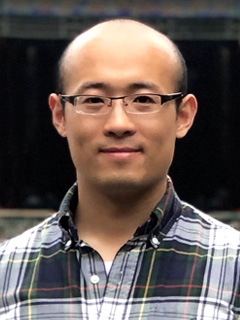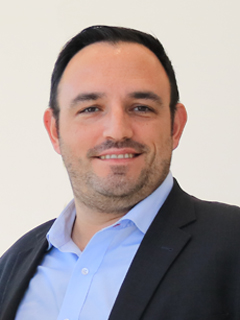HOW CAN WE HELP YOU? Call 1-800-TRY-CHOP
In This Section
AHA, Sontag Award, Preterm Birth, AACAP President, Rising Star Award

After you’ve enjoyed your Thanksgiving feast, check out this week’s news roundup from Children’s Hospital of Philadelphia Research Institute. Discover who gave invited presentations at the American Heart Association Scientific Sessions, who received a Distinguished Scientist Award from the Sontag Foundation, who the American Academy of Child and Adolescent Psychiatry named as its president, and who the Biomedical Engineering Society recognized as a “Rising Star.” And learn more about a study on racial disparities in preterm birth.
CHOP Researchers Showcase Work at American Heart Association Meeting

Matthew Gillespie, MD
CHOP represented its hometown at the annual American Heart Association Scientific Sessions held in Philadelphia Nov. 11-13. From poster and oral abstract presentations, to moderating sessions, to invited presentations, CHOP faculty and researchers from the Cardiac Center showcased their latest and greatest work.
Among the nine faculty members giving invited presentations, Matthew Gillespie, MD, attending cardiologist in the Cardiac Center and medical director of the Cardiac Catheterization Laboratory, gave a presentation titled “Transcatheter Therapies for Systemic AV Valve Regurgitation in Pediatric and Congenital Heart Disease.” His talk centered on MitraClip™ (Abbott) transcatheter mitral valve repair, a therapy designed for adult patients with previous myocardial infarction. Dr. Gillespie focuses on bringing this procedure to children and young adults with congenital heart disease and mitral regurgitation.
“This is off-label work we’re doing for patients who don’t have any other option,” Dr. Gillespie said. “It’s another frontier we’re blazing to bring more options to children with congenital heart disease.”
Other invited presentation speakers included Joseph Rossano, MD, co-director of the Cardiac Center and chief of the Division of Cardiology; Vivek Allada, MD, medical director of Outpatient and Community Cardiology and associate chief of Cardiology; Victoria Vetter, MD, attending cardiologist and medical director of Youth Heart Watch; Amy Lisanti, PhD, RN, nurse-scientist and clinical nurse specialist; Ryan Callahan, MD, attending cardiologist; David Frank, MD, PhD, attending cardiologist and director of the Center on Cardiac Anticoagulation and Thrombosis; and Laura Mercer-Rosa, MD, MSCE, attending cardiologist.
Rounding out CHOP’s presence at the meeting were four oral abstract presentations, two rapid-fire oral abstracts, and 23 posters. Four physicians served as moderators, and three served as poster professors.
CHOP Scientist Receives Prestigious Sontag Award to Advance Brain Cancer Research
Leyuan Ma, PhD, an investigator with CHOP Research Institute, received the Distinguished Scientist Award from the Sontag Foundation, one of the largest private funders of brain cancer research in North America. Dr. Ma is one of three scientists selected through a competitive scientific review process who will receive a $750,000 grant for the potential of their research to make a significant impact in the field of brain cancer.
“Being a DSA awardee and part of this community is a fantastic opportunity to exchange our findings and perspectives on brain tumors,” said Dr. Ma, who is also an assistant professor of Pathology and Laboratory Medicine at the Perelman School of Medicine at the University of Pennsylvania. “The novel T-cell therapy in my Sontag project has the potential of treating nearly all brain tumors and preventing relapse. This goal can be faster and better achieved by working collaboratively within the Sontag community.”
Dr. Ma’s project, “Engineering a sustainable pan-brain tumor targeting CAR T-cell therapy,” involves the emerging opportunity of treating brain tumors with engineered T-cell therapy directed against selected targets on tumor cells; however, many single-target directed T-cell therapies have failed due to the tumor heterogeneity and subsequent tumor escape.
To ensure robust tumor recognition and minimize the impact of tumor heterogeneity, Dr. Ma’s team engineers T cells in a way that they can simultaneously detect and target multiple genetic and non-genetic features that are highly conserved in brain tumors while preventing on-target and off-tumor toxicity. This novel engineered T-cell therapy potentially benefits all patients with primary or relapsed brain tumors.
For more information, see this Sontag press release.
CHOP Researchers Report Racial Disparities in Preterm Birth in Philadelphia
CHOP researchers quantified racial disparities in spontaneous and medically indicated preterm birth in Philadelphia, by analyzing a decade of data. The researchers led by Heather Burris, MD, MPH, attending physician in the Division of Neonatology, conducted the study, which appeared in an online article ahead of print in the American Journal of Epidemiology.
Dr. Burris, who is also an associate professor of Pediatrics at the Perelman School of Medicine at the University of Pennsylvania, and her team evaluated a pregnancy cohort of 83,952 singleton births at two Philadelphia hospitals from 2008 to 2020. They classified preterm births as spontaneous or medically indicated. They studied the racial disparities between non-Hispanic Black and non-Hispanic white individuals.
They found significant racial disparities in preterm birth. The unadjusted relative risk of preterm birth was 1.78 in Black compared to white patients. The relative risk ratio for the Black-white racial disparity was 20% higher for medically indicated preterm birth versus spontaneous preterm birth. There was also significant geographic variation in preterm birth overall, medically indicated preterm birth, and spontaneous preterm birth.
“Our findings underscore the importance of distinguishing [preterm birth] phenotypes within the context of public health and preventative medicine,” the researchers wrote. “Future work should consider social and environmental exposures that may explain geographic differences in [preterm birth] risk and disparities.”
Tami Benton, MD, Welcomed as President of American Academy of Child and Adolescent Psychiatry
The American Academy of Child and Adolescent Psychiatry’s (AACAP) welcomed CHOP’s Psychiatrist-in-Chief Tami Benton, MD as the organization’s 36th president for the 2023-2025 term. Dr. Benton, who is also executive director of the Department of Child and Adolescent Psychiatry and Behavioral Sciences, will focus on her theme, “Bringing the Village to the Children.”
“I am profoundly honored to serve as AACAP’s president,” Dr. Benton said at the AACAP Conference in October. “My theme, informed by decades of practice, AACAP membership, and the insights shared by our community, will be centered on enriching children’s mental health. I look forward to collaborating closely with each member of AACAP to realize our shared vision.”
In addition to clinical work, Dr. Benton is an associate professor of psychiatry at the Perelman School of Medicine at the University of Pennsylvania and dedicates time to research. Her research focuses on pediatric mood and anxiety disorders, sickle cell disease and psychiatric conditions, HIV and psychiatric conditions, neuroimmunology and mood disorders, health services research, eating disorders, and ethnically diverse children.
For more information, see CHOP News.
Riccardo Gottardi, PhD, Receives Biomedical Engineering Society Award
Riccardo Gottardi, PhD, assistant professor in the Bioengineering and Biomaterials Laboratory at CHOP, received the Rising Star Award from the Biomedical Engineering Society-Cellular and Molecular Bioengineering (BMES-CMBE). The Rising Star Award recognizes a BMES-CMBE member who is at the early independent career stage and has made an outstanding impact on the field of cellular and molecular bioengineering. Awardees will give an oral presentation on their research at the BMES-CMBE conference in Puerto Rico in January and be recognized at the conference Gala dinner.
Dr. Gottardi’s research focuses on engineering solutions for pediatric health, primarily for airway disorders. He has previously received awards for work to create a biomaterial patch to repair the tympanic membrane and for work to develop cartilage implants to treat severe subglottic stenosis. He received grant support from the National Institutes of Health to further his work in subglottic stenosis.
ICYMI
Catch up on our headlines from our Nov. 10 In The News:
- AHRQ Award Supports Career Development in Patient-Centered Outcomes Research
- CHOP Researcher Honored With Penn Medicine Award of Excellence for Mentorship
- Clinical Futures Director Receives Samuel Martin Health Evaluation Sciences Research Award
- $1.3 Million Donation Will Fund Neuroblastoma Research
- New Gene Editing Techniques Suggest Significant Improvements for PKU Treatments
- Researchers Present Abstract Revealing Disparities in Pediatric Cardiac Arrest at AHA
Keep up with our news, stories, and updates in real time by following us on X, LinkedIn, and Instagram. Meet the minds behind the science in the Bench to Bedside podcast. Or subscribe to our newsletter to receive an email every other Friday by signing up here.





